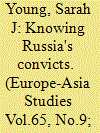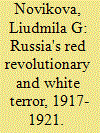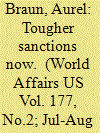|
|
|
Sort Order |
|
|
|
Items / Page
|
|
|
|
|
|
|
| Srl | Item |
| 1 |
ID:
102708


|
|
|
|
|
| Publication |
2011.
|
| Summary/Abstract |
This paper is based on an earlier one about James Baillie Fraser's trip to Khorasan in the 1820s, the first European to travel there in the Qajar era. But instead of focusing on Fraser's experience, the information given by him is used to view the circumstances in Khorasan from an Iranian perspective, which, in turn, is derived from a study of the three main categories of people met by Fraser. Through them and their careers, the paper analyzes the problems, both inherited and new, that the early Qajars faced from the outset. Each of the three categories is dealt with separately under the headings of Prince-Governors, Princes in Exile or in Obeisance and, finally, High Priests. Together these complete the overall picture in Greater Khorasan and, by extension, throughout Iran at that particular time. What emerges from a study of their careers are the seeds of some of the major trends that were to mark nineteenth-century Iran. Khorasan, with its size and position, was particularly well placed to afford a view of a society still dependent on tribal vagaries and the dominant role of the religious hierarchy. Above all, the geo-strategic location of the province affords a privileged view across to the outlying parts of Greater Khorasan which, although still viewed from inside as a part of Greater Iran, were, due to inherent instabilities, liable to manipulation by British and Russian imperialism. The most effective tool of the latter was a propensity to promote new national entities on the ruins of an empire struggling to sustain itself without means and with a dated mindset of which most people were sorely unaware. By projecting the circumstances of time and place onto the future, one can perceive a certain degree of inevitability in the upcoming history of Qajar Iran.
|
|
|
|
|
|
|
|
|
|
|
|
|
|
|
|
| 2 |
ID:
124303


|
|
|
|
|
| Publication |
2013.
|
| Summary/Abstract |
The essay explores the significance of questions of knowledge to the depiction of prisoners in three prominent katorga narratives from the second half of the nineteenth century: Dostoevskii's Notes from the House of the Dead, Kennan's Siberia and the Exile System, and Chekhov's Sakhalin Island. Comparing the different discourses of unknowability these authors employ, it argues that the relationship of the writers or narrators to the outcast status of the convicts takes their texts beyond the immediate context, to shape views of the penal system as expressing the increasing instability of identity, social hierarchies and moral life in Russia.
|
|
|
|
|
|
|
|
|
|
|
|
|
|
|
|
| 3 |
ID:
130841


|
|
|
| 4 |
ID:
027966


|
|
|
|
|
| Publication |
Cambridge, Harvard University Press, 1974.
|
| Description |
303p.hbk
|
| Series |
Harvard East Asian Series; 79
|
| Standard Number |
0674783204
|
|
|
|
|
|
|
|
|
|
|
|
Copies: C:1/I:0,R:0,Q:0
Circulation
| Accession# | Call# | Current Location | Status | Policy | Location |
| 014954 | 951.035/PRI 014954 | Main | On Shelf | General | |
|
|
|
|
| 5 |
ID:
124309


|
|
|
|
|
| Publication |
2013.
|
| Summary/Abstract |
This essay re-examines White and Red terror during the Russian Civil War by studying public participation in the acts of political violence. It shifts attention from the ideological and political motifs of terror to places and contexts where violence occurred. On the example of paramilitary groups of White and Red partisans in Arkhangel'sk province in the Russian North, it demonstrates how local factors, such as the nearby frontline, poor economic conditions or traditional enmity between neighbouring communities, contributed to the escalation of terror at a grass-root level.
|
|
|
|
|
|
|
|
|
|
|
|
|
|
|
|
| 6 |
ID:
132149


|
|
|
|
|
| Publication |
2014.
|
| Summary/Abstract |
This spring, as Russia's puppet government in Crimea moved clocks forward two hours to coincide with Moscow time, Vladimir Putin seemed intent on moving the historical clock backwards to the age of nineteenth-century Russian imperialism. As the leader of an economically weak and vulnerable country with a corrupt governing class, the Russian president acted with brazen disregard for international law and norms, while the democratic West played a totally reactive role, and a feckless one at that. Ignoring very reluctantly introduced, and very limited, sanctions, Putin reciprocated with utter contempt for capitalist democracies, where he believes profits will always trump principle, and especially for President Obama, who, in the Russian dictator's view, finds Western unity only in weakness, not in strength. But even though what appear to be irreversible faits accomplis occur every day in Crimea and eastern Ukraine, it is not too late for the West to seize the initiative, mobilize its vast economic and political capacity, and put Putin and the "yes" chorus of siloviki, who surround and encourage him, truly on the defensive.
|
|
|
|
|
|
|
|
|
|
|
|
|
|
|
|
| 7 |
ID:
171584


|
|
|
| 8 |
ID:
193142


|
|
|
|
|
| Summary/Abstract |
Russia's full-scale war against Ukraine represents a critical juncture for the role gender plays in European security. We argue that the Russian invasion of Ukraine is not only gendered in the way other conflict are, but the war's essential novelty lies in the fact that it is explicitly fought for the so-called traditional values, against gender and sexual equalities. Drawing on local decolonial insights and theoretical concepts of liberal/illiberal gender orders, we contrast the Russian neo-traditionalism with the Ukrainian account of the Russian invasion, while seeking to uncover how an imagination of Europe is constitutive for these gendered discourses. We show that the construction of the narratives is a circular process of ever more pronounced neo-traditionalism by Russia which sees Europe as its decadent Other. We demonstrate that these discourses have real consequences as the Russian illiberal gender order justifies and wages real war against Ukraine and gender is turning into the central battlefield both in the figurative and the literal sense of the word. Russian accounts contrast with Ukraine's hybridised, but increasingly emancipatory discourses and practices which have been playing a fundamental role in Ukraine's resistance to the Russian invasion.
|
|
|
|
|
|
|
|
|
|
|
|
|
|
|
|
| 9 |
ID:
191724


|
|
|
|
|
| Summary/Abstract |
Although firmly established as a global norm, the Women, Peace and Security Agenda (WPS) has been largely driven by the global North attempting to solve insecurities in the global South. Postcolonial feminist research shows that this western-centrism and colonial legacies continue to dominate both WPS practices and knowledge production. This article focuses on WPS in central Europe, a previously ignored ‘non-region’ that remains outside the North–South divide. Combining postcolonial and decolonial approaches with feminist institutionalism, we interrogate what WPS becomes in the Czech, Polish and Slovakian contexts characterized by illiberal populist and anti-gender governance and politics. Building on interviews with key stakeholders, on document analysis and our own encounters, we argue that the three countries understand WPS as key to their western belongingness and reliability as international partners. As a result, they replicate rather than challenge ‘western’ WPS thinking. The resulting National Action Plans are centred around women's participation and security problems ‘out there’. This lack of localization enables them to stay immune to the anti-gender alliances, but limits the engagement of feminist civil society. Amidst Russian imperial aggression, central Europe's WPS agendas serve as mere paper tigers and are failing to address the multitude of domestic and regional gendered insecurities.
|
|
|
|
|
|
|
|
|
|
|
|
|
|
|
|
|
|
|
|
|